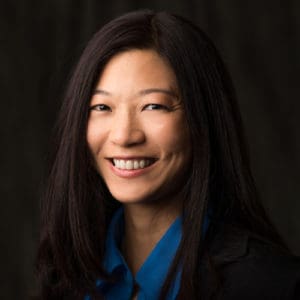Approaching Mediation with Humility. Board Spotlight: Jarling Ho
Jarling Ho is a program manager for the Massachusetts Office of Public Collaboration, the statutory state dispute resolution agency for the Commonwealth of Massachusetts. She received her Bachelor’s degree from The Ohio State University and her J.D. from Lewis & Clark Law School in Portland, Oregon. She has over 15 years of experience in conflict management and has trained and coached hundreds of individuals in conflict management and facilitation. She’s worked in both California and Massachusetts, supporting the public through community mediation centers.
Engaging with MBBI

Jarling has been a member of the MBBI Board since 2019 but has been involved with MBBI since 2015, previously serving as a communications officer and a volunteer for the MBBI Los Angeles Regional Group. She first discovered the organization after attending a conference held at Pepperdine University and had the opportunity to build a relationship with the Chair of the Los Angeles chapter. She became interested in engaging with the organization after learning of MBBI’s guiding principles. “We don’t go unless we’re invited and we always partner with a local group on the ground. The approach felt humble to me.” Recognizing that conflict will look different in different cultural contexts, she greatly values the ethical standards of the organization when they consider engagement with a local community.
Mediation and Cultural Diversity
This respect for diverse communities, their agency, and cultural nuances in mediation would continue to be common themes throughout her life. When Jarling lived in Los Angeles, she became the Executive Director of the Asian Pacific American Dispute Resolution Center. Though her work was centered around the Asian American population, she’s quick to add that it would be incorrect to put the Asian diaspora in a single bucket. She is very aware of her cultural background and the implicit biases that accompany her identity when engaging with immigrants of this community. “I am Asian American. I don’t have the immigrant’s mindset and it’s still very different from the perspectives of an East Asian person.” Thus, she stresses the importance of humility in mediation practice. Jarling explains that she then dedicated herself to understanding the various cultural nuances involved when engaging with the robust Chinese and Japanese communities in the Los Angeles area, learning to appreciate what would and wouldn’t resonate when mediating within these groups. When she was the Executive Director, she was also very intentional about recruiting mediators and facilitators who were originally from these East Asian countries, which differed greatly from other centers’ practices who would recruit staff without as much consideration for cultural differences in conflict resolution and mediation.
Leadership and Social Change
Jarling has hope that there will continue to be a transition towards greater cultural inclusion and an appreciation for diverse approaches in the mediation field. “There’s more openness to it now and it coincides with the BLM movement, the social reckoning that has happened in the U.S.” Though the field has historically been dominated by the Global North, there appears to be a gradual shift towards recognizing that in order to better serve communities around the world, it can’t be America-centric. In her own work in Massachusetts today, she is beginning to examine the organizational structure in her organization and identifying ways to dismantle structural racism to make the conflict resolution field more equitable and inclusive. “There are a lot of assumptions and cultural learnings that have yet to be recognized.” These changes will take time, but she’s hopeful that practitioners will recognize that Western mediation is not the only possibility and become more willing to have a broader perspective on this field as a whole.
She is also optimistic about how the definition of leadership and the expectations around what a leader looks like have changed in the recent past. When Jarling became a director in Los Angeles, she felt a degree of pressure to cultivate the societally expected qualities of a leader, to be more forceful and direct. She was no stranger to these social pressures as the legal field in which she’d previously operated was patriarchal and homogenous; she felt like she didn’t belong. Today, she recognizes that with the work of changemakers like Brené Brown, the image of a leader is also changing and becoming more diverse. “That shift is helping people of color to step into a space and be leaders, not feel less-than.”
Jarling’s dedication to continued social progress is exemplified through her collaborative, inclusive approach to mediation and deep respect for individuals because, as she explains, people are extremely complex. “It’s like the Shrek quote,” she laughs, “people are like onions and you have to peel away the layers.” She honors each individual with whom she interacts and aims to respect everyone’s whole selves because we often only see a small portion of who someone is.
Article by Chloe Pan, MBBI Writer
